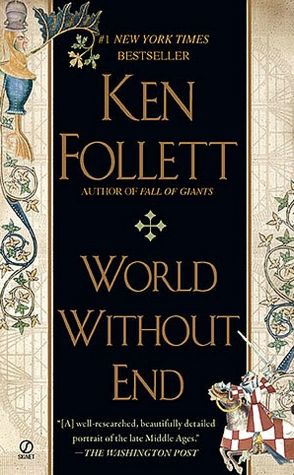Book Review:
The Pillars of the Earth & World Without End
The Pillars of the Earth Series
By Ken Follett
I was hesitant to pick up The Pillars of the Earth and it’s sequel, World Without End. You see, whenever there’s hype about a movie, I tend to be sorely disappointed. It’s less the case with books, but the hype still makes me wary about starting a certain books. What had I heard about these two epic novels (almost 1,000 pages each) ? I heard that The Pillars of the Earth was amazing, and World Without End was a let down after the first novel.

The Pillars of the Earth: While I enjoyed this first book, by no means did I think it lived up to all the hype. I appreciated the historical setting and the plot. The book was largely centered around the growth of a priory and town, and the efforts of its inhabitants to better their lives. The construction of the town’s cathedral played a central part in the story, throughout the book.
I appreciated the characters: monks and a prior at a monastery who struggled to bring wealth to the town and overcome obstacles from the priory’s superiors; a builder and his children, who struggled to not only survive but to reach his goals of building one of the greatest cathedrals in England; a noblewoman whose family had fallen from their position, her struggle to support herself and her brother, and her search for happiness; and noblemen who terrified the town. Some characters were horribly crude and mean. Those characters made me thankful that I didn’t live in that time, where pillaging and rape seemed to be almost expected and accepted. But the characters that persevered despite all that was against them gave me hope. They worked and fought so hard, I was happy to see them achieve their goals and desires in the end.
World Without End: Like The Pillars of the Earth, the World Without End was not what I had heard. I heard it was very disappointing. Some even argued not worth reading. I debated about whether or not to read the novel but I don’t like not finishing series so I gave it a shot. I actually found it easier to get into, but there was most definitely a dry period in the middle of the book. I’m glad I read the second book but it definitely wasn’t as good as the first.
World Without End had the same strengths as The Pillars of the Earth – a fantastic historic perspective and very strong characters. However, the plot was a bit more difficult to get through. The construction of town landmarks – a bridge, a hospital, the rebuilding of the cathedral – continued to play an important part in the book, but so did war and the plague. It was the emphasis on war towards the center of the book that made this book drag, but once those scenes passed, the book picked up again.
Several of the characters in this sequel were ancestors of the main characters in The Pillars of the Earth. The characters were constantly overcoming obstacles to their wealth and happiness – a cruel nobleman, an unfair religious figure, laws favoring the nobility… but despite all of it, they persevered. Their dedication towards their professions, their friends, and their family were encouraging. To push so hard in the face of so many challenges is really inspiring.
Recommendation: If you enjoy novels set in the past, then these two books are worth reading. If that’s not your cup of tea, these will probably be difficult to make it through.
Grade: B-

Wow. I adored both these books immensely. I read Pillars twice! Sometimes I would wake up in the middle of the night and read it for like 30 minutes and then go back to sleep. I haven’t seen the movies or heard anything about them.
I’ve loved everything I’ve ready Follett. He is so versatile and seems to accurately represent whatever topic he’s writing about.